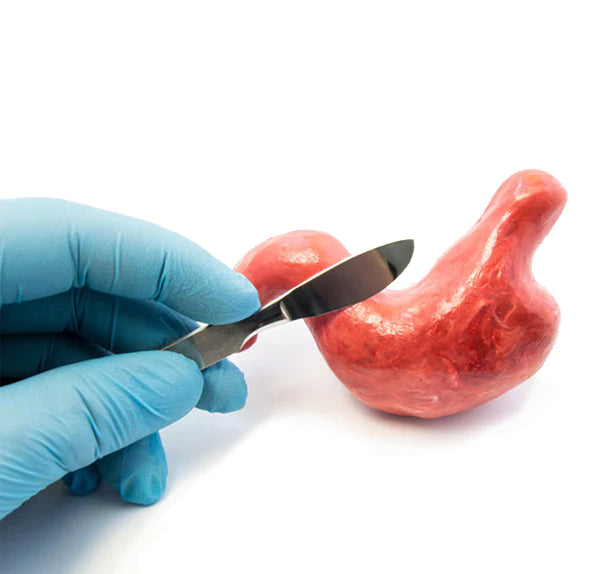Preparing for Bariatric Surgery
For your surgery to be as safe as possible, your team will give you specific preparation recommendations once your procedure date is finalized.
Pre-Op Plan:
You will often need to sustain a very low-calorie diet, consuming meal replacement shakes, soups, and some small meals for some time before your surgery. The recommendations for this stage may vary depending on your team.
Many of them are personalised, so it is crucial to follow the recommendations made for you, even if they are different from someone you know has been through the same process.
This "pre-op" phase is not aimed at weight loss directly.
The most important outcome of your pre-op phase is reducing the size of your liver to make sure the surgery can go ahead safely.
Your Bariatric Surgeon will tell you more about preparation for the actual procedure, including a preparation phase and a fast.

Exercise:
Being more active is an excellent complement to your preparation for surgery. Once you get the all-clear from your team, start gradually, and do something you enjoy by moving 20 to 30 minutes daily.
It will decrease the risk of complications during surgery, help with weight loss and get into a routine that will lead to long-term weight loss.
Exercise is also a great way to support your pre-surgery nerves and encourage a good night's rest.

Smoking:
If you smoke, you will need to completely stop for at least three months before any surgery can go ahead, as smoking poses severe risks for surgery. Quitting smoking can be difficult; your Bariatric team can help with the resources and support you need.
Some surgeons will not operate on patients who use cigarettes. Depending on your specific needs and medical history, your team may have slightly different recommendations for you. Ensuring you take these recommendations is vital for your safety and feel more confident with the surgery.

Nutrition and Recovery:
Being "nutritionally fit" as you possibly can make all the difference to your recovery from surgery. Many Bariatric patients are deficient in Iron, B12 and Vitamin D before surgery. Catching these up after the procedure is made more difficult by the malabsorption the surgery causes.
Your team should run a complete set of blood tests to see where you are sitting in the pre-op stage. If you see any nutrients falling into the lower ends of the healthy range - this is the time to work on boosting.
Bariatric patients cannot absorb some nutrients efficiently due to the changes in the digestive system and reduced food intake.

Medical Tests Before Bariatric Surgery
Weight Loss Surgery is a life-changing decision and carries certain risks.
Your surgeon will likely run a range of medical tests before your surgery to implement a safer process and decrease the chances of added complications that could compromise your well being and safety. Understanding the medical testing process can help put your mind at ease to help ensure that you are fully prepared for your surgery.
What medical tests may I need before Bariatric Surgery?
Barium swallow test
A barium swallow test provides your surgeon with a "road map" of your anatomy and digestive processes. It helps identify any potential complications that may hinder your surgery and recovery.
EKG (Electrocardiogram)
EKG (Electrocardiogram) measures the electrical activity of your heart. It can help rule out any underlying heart conditions that could complicate your surgery.
Exercise stress test
Exercise stress test involves walking on a treadmill or using an exercise bike and evaluating your cardiac function (heart functions) to determine how well your body manages physical activity.
Ultrasound
Ultrasound can identify any gallbladder inflammation or gallstones - if abnormalities in the gallbladder are found, your gallbladder may be removed during your surgery.
Thyroid test
A thyroid test and complete blood count is an all-inclusive overview of your overall health, helping to ensure you are ready for Bariatric Surgery.
Blood tests
A complete set of blood tests will assess your current state of health and act as a baseline for your nutrient levels. After Weight Loss Surgery, regular bloods will need to be checked for life. Any nutritional deficiencies are actioned before they have an opportunity to affect your newfound good health!
Psychological Consultation
Weight Loss Surgery is not a one thought decision. The more you learn about bariatric surgery, the higher your chance of success is.
A Bariatric psychologist is an integral partner to support you from the very beginning and throughout your journey in pursuit of improving your quality of life and mental and physical health conditions.
Why is a Pre-Bariatric Surgery psychological consultation necessary?

Your surgeon and insurance require it.

Learn more about your challenges around eating, unique triggers, reasons for your habits and obstacles that prevent you from staying on track and provide you with a plan to help you post-surgical success.

Discuss the surgery's psychological, behavioural and relational impacts on you.

Support you to prepare for surgery and beyond from the very beginning.
Pre-Surgery Diet
Once your Weight Loss Surgery is confirmed, your surgeon and dietitian will have you start a bariatric 'pre-op' diet to prepare for surgery. The diet before Bariatric Surgery is crucial to the safety of your surgery, and believe it or not, the focus of this stage is not on weight loss; it's all about reducing "fatty liver" to ensure the surgeon can perform your procedure safely.
Two weeks before surgery, you'll be on a Very Low Calorie (VLCD) preparation plan, including:

Meal replacements

Water

Soups

High-protein, low-calorie foods
Support Group Meetings
Bariatric Surgery is a significant event at the beginning of your weight loss journey. Ongoing support needs to be a large part of the process to keep the weight off long term. We highly recommend attending at least two monthly support group meetings before your Bariatric / Weight Loss Surgery.
Support groups are designed to meet, interact and discuss problems, fears and achievements with others who can understand what you are going through and provide support. It can make a massive difference to the success of your weight loss journey, helping you know what to expect.
You will gain value from the information received and meet people who can share your journey and identify who genuinely appreciate your situation.

Final Steps to Getting Bariatric Surgery
Some of the final steps before Bariatric Surgery include:
Insurance approval:
Once you have completed all required medical tests, your Bariatric team will send the necessary documentation to your insurance company for pre-authorisation. The approval process will depend on your insurance company.
Schedule surgery:
Your Bariatric team will work with you to determine a surgery date and prepare you for the final steps.
Reassess what to expect:
Your Bariatric dietitian will educate you on your Post-Bariatric Surgery diet. Your Bariatric Surgeon will review what to expect at the hospital with you before surgery.
Pre-Bariatric Surgery Frequently Asked Questions
-
What is the process of undergoing Weight Loss Surgery?
Evaluation appointments are commonly scheduled 2-3 months in advance.
After this initial visit, the patient will participate in many visits to learn more about bariatric diet, supplements and exercise strategies.
Once the patient has completed these processes, and if the surgeon and patient have agreed the operation is appropriate, the surgery will typically be scheduled within six weeks after their insurance authorises. -
Why do I need to complete a psychological evaluation?
It is to fulfil insurance company requirements. Also, evaluate the patient's knowledge and understanding of the risks and complications and the responsibilities related to Bariatric Surgery to have the ability and commitment to follow through with the lifestyle changes.
-
Why do I need to complete pre-operative Bariatric Surgery tests?
Before surgery, a thorough assessment of your health is required to understand any potential complications.
Your current nutritional status is essential, so any nutrients that are not in the higher end of the healthy range can be boosted - nutrients are in high demand after surgery for rebuilding and recovery, and food intake is often limited.
If you have diabetes, specific steps must be taken to control your blood sugar; as the surgery itself increases cardiac stress but your heart will be thoroughly evaluated. -
What will my Pre-Bariatric Surgery tests determine?
Pre-Bariatric Surgery tests will determine if you have:
Breathing difficulties
Excess fluid in the tissues
Liver malfunction
Abnormal blood fat levels
Abnormalities in body fluids
Sleep apnoea -
Why is a sleep study necessary before Bariatric Surgery?
A sleep study detects if you have sleep apnoea. It is a prevalent condition in overweight patients that impacts breathing while sleeping.
Sleep apnoea can be severe after surgery as the patient is under pain medications and sedations from the anesthesia.
It further depresses normal breathing and reflexes. If that is the case, you will need a CPAP to help you breathe at night.